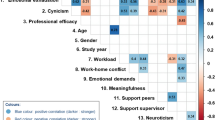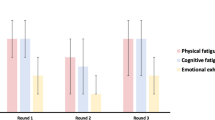Abstract
Burnout syndrome is widespread among healthcare professionals, causing many physical and mental problems for individuals, and leading to negative outcomes for organizations and the quality of care that they provide. The aim of this study was to assess burnout among master’s degree nursing students and to evaluate its possible relationship with a compromising negotiation style. A descriptive comparative study was conducted. Nurses’ personal, academic, and professional data were collected. Burnout was measured using the Italian version of the Oldenburg Burnout Inventory, with its two dimensions of disengagement and exhaustion. Negotiation skills were assessed through a Serious Game based on Rahim and Bonoma’s theory of conflict management that included daily life five scenarios. Descriptive and inferential statistics were performed in a sample of 33 students. The results showed a mean disengagement level of 3.2 (SD 0.6) points and an exhaustion level of 2.8 (SD 0.7) points. In three serious game scenarios, students who did not use a compromising negotiation style had significantly higher disengagement levels than those who did (Sports, p = 0.019; Motorbike, p = 0.008; CD Store, p < 0.001). The students seemed to appreciate the engagement in the study and the game used. This is the first study to assess burnout together with negotiation styles identified through a Serious Game. The findings suggest that implementing alternative training strategies, combined with traditional teaching could support students in better integrating theoretical and practical knowledge and engaging in active learning.
Access this chapter
Tax calculation will be finalised at checkout
Purchases are for personal use only
Similar content being viewed by others
Notes
- 1.
In Italy, academic exams are graded on a 30-point scale. A grade of 0–17 means “fail,” 18 is considered satisfactory, 19–21 is considered good, 22–25 is considered very good, and 26–30 is considered excellent [18].
- 2.
Enhancing Negotiation skills through on-line Assessment of Competencies and interactive mobile Training – GA 543301-LLP-1–2013-1-UK-KA3-KA3MP 2013 (http://enactgame.eu/site/).
References
Maslach, C., Leiter, M.P., Schaufeli, W.: Measuring Burnout. The Oxford Handbook of Organizational Well Being (2009)
Jun, J., Ojemeni, M.M., Kalamani, R., Tong, J., Crecelius, M.L.: Relationship between nurse burnout, patient and organizational outcomes: systematic review. Int. J. Nurs. Stud. 119, 103933 (2021)
Poghosyan, L., Clarke, S.P., Finlayson, M., Aiken, L.H.: Nurse burnout and quality of care: cross-national investigation in six countries. Res. Nurs. Health 33, 288–298 (2010)
Garcia, C.D.L., et al.: Influence of burnout on patient safety: systematic review and meta-analysis. Medicina (Kaunas) 55, 553 (2019)
Darban, F., Balouchi, A., Narouipour, A., Safarzaei, E., Shahdadi, H.: Effect of communication skills training on the burnout of nurses: a cross-sectional study. J. Clin. Diagn. Res. 10, IC01-IC04 (2016)
Aryankhesal, A., et al.: Interventions on reducing burnout in physicians and nurses: a systematic review. Med. J. Islam. Repub. Iran 33, 77 (2019)
Ahmadi, A., Ahmadi, M., Elyasi, F., Ahmadi, A., Ahmadi, N.: The relationship of occupational burnout and communication skills in nurses. J. Maz. Univ. Med. Sci. 23, 130–139 (2013)
Shimizu, T., Mizoue, T., Kubota, S., Mishima, N., Nagata, S.: Relationship between burnout and communication skill training among Japanese hospital nurses: a pilot study. J. Occup. Health 45, 185–190 (2003)
Michael, D.R., Chen, S.L.: Serious Games: Games that Educate, Train, and Inform. Muska and Lipman, Premier-Trade (2005)
Vieira, C., Ferreira da Silva Pais-Vieira, C., Novais, J., Perrotta, A.: serious game design and clinical improvement in physical rehabilitation: systematic review. JMIR Serious Games 9, e20066 (2021)
Whyte, E.M., Smyth, J.M., Scherf, K.S.: Designing serious game interventions for individuals with autism. J. Autism Dev. Disord. 45(12), 3820–3831 (2014). https://doi.org/10.1007/s10803-014-2333-1
Martinez, K., Menéndez-Menéndez, M.I., Bustillo, A.: Awareness, prevention, detection, and therapy applications for depression and anxiety in serious games for children and adolescents: systematic review. JMIR Serious Games 9, e30482 (2021)
Hara, C.Y.N., Goes, F., Camargo, R.A.A., Fonseca, L.M.M., Aredes, N.D.A.: Design and evaluation of a 3D serious game for communication learning in nursing education. Nurse Educ. Today 100, 104846 (2021)
Buijs-Spanjers, K.R., et al.: The influence of a serious game’s narrative on students’ attitudes and learning experiences regarding delirium: an interview study. BMC Med. Educ. 20, 289 (2020)
Petit dit Dariel, O.J., Raby, T., Ravaut, F., Rothan-Tondeur, M.: Developing the Serious Games potential in nursing education. Nurse Educ. Today 33, 1569-1575 (2013)
Zeffiro, V., Di Fuccio, R., Vellone, E., Alvaro, R., D’Agostino, F.: A serious game and negotiation skills in nursing students: a pilot study. In: Kubincová, Z., Lancia, L., Popescu, E., Nakayama, M., Scarano, V., Gil, A.B. (eds.) MIS4TEL 2020. AISC, vol. 1236, pp. 91–98. Springer, Cham (2021). https://doi.org/10.1007/978-3-030-52287-2_9
Berlin, J.W., Lexa, F.J.: Negotiation techniques for health care professionals. J. Am. Coll. Radiol. 4, 487–491 (2007)
European Commission: ECTS users’ Guide. Publications Office of the European Commision (2015)
Demerouti, E., Nachreiner, F.: Aufsätze - zur spezifität von burnout für dienstleistungsberufe: fakt oder artefakt. Zeitschrift für Arbeitswissenschaft 52, 82–88 (1998)
Halbesleben, J.R., Demerouti, E.: The construct validity of an alternative measure of burnout: investigating the English translation of the Oldenburg burnout inventory. Work Stress 19, 208–220 (2005)
Demerouti, E., Bakker, A.B., Vardakou, I., Kantas, A.: The convergent validity of two burnout instruments: a multitrait-multimethod analysis. Eur. J. Psychol. Assess. 19, 12 (2003)
Njim, T., et al.: Determinants of burnout syndrome among nursing students in Cameroon: cross-sectional study. BMC Res. Notes 11, 450 (2018)
Rudman, A., Gustavsson, J.P.: Burnout during nursing education predicts lower occupational preparedness and future clinical performance: a longitudinal study. Int. J. Nurs. Stud. 49, 988–1001 (2012)
Bulfone, G., et al.: Psychometric evaluation of the Oldenburg burnout inventory for nursing students. J Nurs Meas (2021)
Basinska, B.A., Gruszczynska, E.: Burnout as a state: random-intercept cross-lagged relationship between exhaustion and disengagement in a 10-day study. Psychol. Res. Behav. Manag. 13, 267–278 (2020)
Rahim, A., Bonoma, T.V.: Managing organizational conflict: a model for diagnosis and intervention. Psychol. Rep. 44, 1323–1344 (1979)
Johnson, D., Gardner, M.J., Perry, R.: Validation of two game experience scales: the player experience of need satisfaction (PENS) and game experience questionnaire (GEQ). Int. J. Hum Comput. Stud. 118, 38–46 (2018)
Ryan, R.M., Rigby, C.S., Przybylski, A.: The motivational pull of video games: a self-determination theory approach. Motiv. Emot. 30, 344–360 (2006)
Salvagioni, D.A.J., et al.: Physical, psychological and occupational consequences of job burnout: a systematic review of prospective studies. PLoS ONE 12, e0185781 (2017)
Anderson, C., Thompson, L.L.: Affect from the top down: how powerful individuals’ positive affect shapes negotiations. Organ. Behav. Hum. Decis. Process. 95, 125–139 (2004)
Fisher, R.J.: Prenegotiation problem-solving discussions: enhancing the potential for successful negotiation. Int. J. 44, 442–474 (1989)
Author information
Authors and Affiliations
Corresponding author
Editor information
Editors and Affiliations
Rights and permissions
Copyright information
© 2023 The Author(s), under exclusive license to Springer Nature Switzerland AG
About this paper
Cite this paper
Zeffiro, V. et al. (2023). Burnout Syndrome Among Master’s Degree Nursing Students Using a Compromising Negotiation Style Evaluated Through a Serious Game. In: Kubincová, Z., Melonio, A., Durães, D., Rua Carneiro, D., Rizvi, M., Lancia, L. (eds) Methodologies and Intelligent Systems for Technology Enhanced Learning, Workshops, 12th International Conference. MIS4TEL 2022. Lecture Notes in Networks and Systems, vol 538. Springer, Cham. https://doi.org/10.1007/978-3-031-20257-5_17
Download citation
DOI: https://doi.org/10.1007/978-3-031-20257-5_17
Published:
Publisher Name: Springer, Cham
Print ISBN: 978-3-031-20256-8
Online ISBN: 978-3-031-20257-5
eBook Packages: Intelligent Technologies and RoboticsIntelligent Technologies and Robotics (R0)




